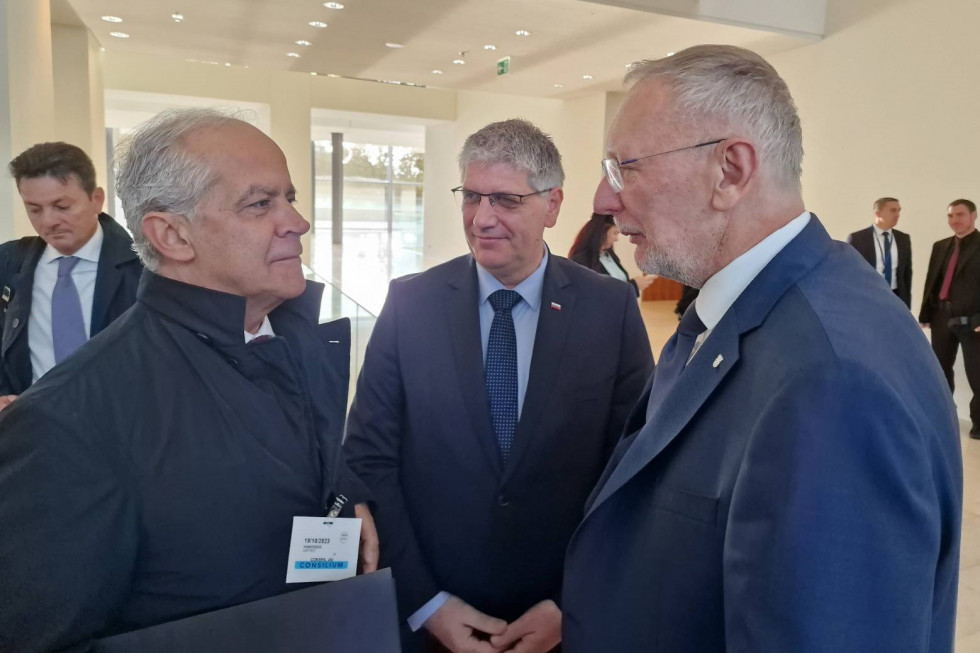Home Affairs Council discusses the state of the Schengen area
The morning's discussion focused on the regulation on preventing and combating child sexual abuse and the state of the Schengen area. Over a working lunch, home affairs ministers exchanged views on the situation in the Middle East.
In the format of the Schengen Council, ministers took stock of the situation in the Schengen area and discussed the fight against cross-border crime, focusing on effective measures to combat migrant smuggling as an important element in ensuring internal security and a resilient Schengen area.
"In recent days, we have witnessed extremely worrying developments in our neighbouring regions, with the continuation of the Russian military aggression against Ukraine and a sharp escalation of the situation in the Middle East. We have also been shaken by the recent terrorist attacks in some Member States," said Minister Poklukar. Yesterday, Italy responded to the latest developments by notifying the European Commission that as of Saturday, it was reintroducing controls at its border with Slovenia for a period of 10 days, with the possibility of an extension. Slovenia has also reacted to the events taking place in the EU's immediate neighbourhood. "I have submitted a proposal to the government to reintroduce border controls at the borders with Croatia and Hungary, which was approved today. The controls will be introduced on the basis of Article 28 of the Schengen Borders Code and the notification has already been sent to all relevant institutions and Member States," the Minister said.
Several ministers acknowledged that recent events are leading to the demise of the Schengen system and that a broader discussion on the future of the Schengen area needs to be launched in order to identify where the main points of divergence lie and what citizens' expectations are. This was also suggested by Minister Poklukar. In addition, the Minister highlighted the fight against migrant smuggling, saying, "We need to take action along the entire migration route, taking into account the links between migrant smuggling and other forms of crime. In this context, we encourage greater exchange of information and more intensive operational cooperation in the form of joint investigations and the establishment of operational task forces."
In the afternoon, the Pact on asylum and migration and the external dimension of migration were discussed. Slovenia supports the early adoption of all legislative proposals under the Pact, which are currently the subject of intensive inter-institutional negotiations. Among the legislative proposals under negotiation is the regulation addressing situations of crisis and force majeure for which a long-awaited negotiating mandate was adopted at the Coreper meeting in early October. Ministers discussed the external dimension of migration, including cooperation with third countries in managing migratory pressures. We are committed to developing appropriate migration management measures to reduce irregular migration and to better regulate legal migration. We are advocating the dignified, safe and sustainable return of migrants with a view to their reintegration in their countries of origin. This objective can be achieved through enhanced cooperation. The key is to establish a dialogue and plan cooperation based on the real needs of the partner country. With regard to countries of origin, it is essential to address the root causes of migration and appropriately adapt humanitarian aid projects and the modalities of technical, development and economic cooperation.
Ministers also discussed preventing the online radicalisation of minors. They agreed that extremist and terrorist movements are becoming increasingly fragmented and unpredictable, taking advantage of the latest technological developments. "Minors are particularly vulnerable to social influence and manipulation. This means that they are unfortunately easy targets for terrorist and extremist organisations spreading radical content," said Minister Poklukar. "It is very important to respond to the threat of radicalisation in a timely manner, i.e. as soon as possible after its emergence. The role of the family is crucial, but early detection of radicalisation and identification of the factors that facilitate radicalisation also require strong cooperation and coordination of actors at the local level, such as schools, social services, healthcare institutions, religious and local communities, and communities of interest. We would particularly like to highlight the work of asylum centres, social workers and other institutions working with migrants as key actors in the successful prevention of radicalisation." Ministers agreed on the need to make better use of the internet and other digital formats to raise young people's awareness of the pitfalls of radicalisation, including through carefully designed awareness programmes and campaigns.

Ministers of the Interior of Italy, Slovenia and Croatia: Matteo Piantedosi, Boštjan Poklukar and Davor Božinović. | Author Ministry of the Interior

